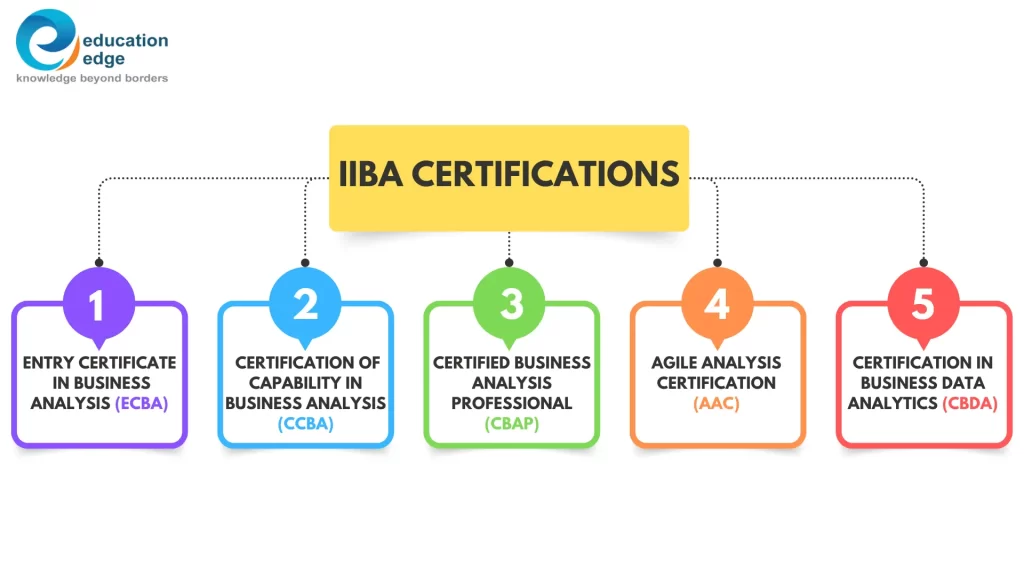
Do you advance your career as a business analyst or gain BA skills? So you need to know what IIBA certification is. International Institute of Business Analysis (IIBA Certification) certifications are worldwide recognized and can help you advance your career in business analysis.
According to IIBA, there are more than 26,500 IIBA certification holders across the world. Additionally, these certifications also boost your salary package. If you also considering pursuing IIBA certification then this blog contains all the information you need. With numerous courses available, it’s essential to select the right one for your needs. In this blog, we will explore the top courses, their requirements, and the IIBA Certification cost.
What is IIBA Certification?
IIBA Certification or International Institute of Business Analysis is a globally recognized association for business analysts. Their certifications validate your skills and knowledge in business analysis, making you a more valuable asset to employers.
The International Institute of Business Analysis is a non-profit professional organization dedicated to improving the practice of business analysis. This provides various life-changing certifications like CBAP, CCBA, ECBA, AAC, and more.
Therefore, these certifications provide you with global professional recognition as well as networking or community involvement which helps in your career growth.
5 Popular IIBA Certifications

1. Entry Certificate of Business Analysis (ECBA):
ECBA Certification is designed for individuals who are new to the field of business analysis or who have limited experience in business analysis. Hence, The purpose of the ECBA certification is to verify a candidate’s fundamental expertise and understanding of fundamental business analysis principles and procedures.
ECBA Eligibility Requirements
Accept the Terms and Conditions
Please make sure to create an account with IIBA
Accept the Code of Conduct
2. Certification of Capability in Business Analysis (CCBA):
The CCBA certification, or Certification of Capability in Business Analysis is a professional credential in the field of business analysis. Hence, it is designed to recognize individuals who have demonstrated a certain level of competence and expertise in business analysis.
CCBA Eligibility Requirements
To earn the CCBA certification, individuals must achieve the following:
- Within the last seven years, obtain at least 3,750 hours of experience in business analysis
- Among these hours, fulfill the requirement of a minimum of 900 hours in each of 2 out of the 6 BABOK Guide Knowledge Areas, or a minimum of 500 hours in each of 4 out of the 6 BABOK Guide Knowledge Areas
- Within the last four years, finish at least 21 hours of professional development
3. Certified Business Analysis Professional (CBAP):
The CBAP certification, or Certified Business Analysis Professional certification is a recognized credential in the field of business analysis. It signifies a high level of expertise and proficiency in business analysis practices and principles.
CBAP Eligibility Requirements
To earn a CBAP certification, individuals must achieve the following:
- Within the last ten years, obtain at least 7,500 hours of experience in business analysis
- Within this experience, ensure a minimum of 900 hours in 4 out of the 6 BABOK Guide Knowledge Areas, totaling at least 3,600 out of the required 7,500 hours
- Complete a minimum of 35 hours of Professional Development within the last 4 years
4. Agile Analysis Certification (IIBA-AAC):
Agile Analysis Certification is a professional credential that demonstrates expertise in applying agile principles to the field of business analysis.
It is designed for business analysts in an agile environment, focused on improving their skills, staying current with industry trends, and following agile best practices in project delivery.
IIBA-AAC Eligibility Requirements
- IIBA has not established specific eligibility requirements for the AAC exam, thereby extending accessibility to a wide array of professionals such as business analysts, consultants, trainers, project managers, developers, CBAPs, and CCBAs
- However, IIBA advises that candidates with 2-3 years of Agile experience are most suitable
- No professional development (PD) hours are required for PMI-AAC
5. Certification in Business Data Analytics (IIBA-CBDA):
Achieving the IIBA-CBDA certification signals to employers your dedication and proficiency in conducting business analysis within analytics projects.
Hence, this certification aids organizations in recognizing qualified professionals with the sought-after skills in business data analytics.
IIBA-CBDA Eligibility Requirements
The eligibility criteria for CBDA include:
- Ideal for business analysis professionals with 2-3 years of experience in data analysis initiatives
- Suitable for data analysis professionals aiming to broaden their skills into the business aspect of data analysis
- No mandatory Professional Development (PD) hours are needed to qualify for the CBDA Certification exam
Cost of IIBA Business Analysis Certification
According to IIBA, here are the list of Business Analysis Certification Cost:
| Certification | Application Fee | Exam Fee | Retake Fee | |||
| Member | Non-Member | Corporate Member | Member | Non-Member | ||
| ECBA | $195 | $350 | $150 | $95 | $250 | |
| CCBA | $145 | $250 | $405 | $205 | $195 | $350 |
| CBAP | $145 | $350 | $505 | $305 | $295 | $450 |
| IIBA-AAC | $250 | $400 | $225 | $195 | $350 | |
| IIBA-CBDA | $250 | $400 | $225 | $195 | $350 | |
Recertification Fee
| Certification | Member | Non-Member | Duration |
| CCBA | $85 | $120 | 3 years (as of the date of certification) |
| CBAP | $85 | $120 | 3 years (as of the date of certification) |
| IIBA-AAC | $30 | $50 | 1 years (as of the date of certification) |
| IIBA-CBDA | $30 | $50 | 1 years (as of the date of certification) |
Why Pursue IIBA Certification?
Pursuing IIBA Certification offers several benefits:
- IIBA certifications are widely recognized in the business analysis field, enhancing your professional credibility
- Certification can lead to better job opportunities and career growth
- IIBA training and exams ensure you have the latest skills and knowledge in business analysis
- Certified professional can get higher salary than non certified professionals
- Certification can make you more valuable to employers in a competitive job market
- IIBA certifications require ongoing professional development, keeping your skills up to date
You may also check: PMP Certification Calgary: Why Choose PMP Certification?
Benefits of IIBA Certification
IIBA certification is beneficial for both individuals as well as organizations. So, here check out the benefits of these certifications.
Benefits to The Individual
- Enhance business analysis principles and practices
- Get a membership in a recognized professional organization.
- Allows you to showcase your abilities in front of professional peers and management to recognize professional excellence.
- Recognition as a skilled business analysis practitioner and offers new job opportunities.
- It allows you to learn more about your field and how it operates.
- Helps in reaching a specific milestone in their BA careers by providing essential skills and knowledge.
- Boost overall performance and provide various market opportunities.
- Having IIBA certification shows your actions are constantly improved and you possess essential skills that are required for business analysis.
- Provide better salary as compared to non-certified professionals.
- Individuals who have invested in their BA careers are recognized and encouraged to continue doing so.
Benefits to The Organization
- Enhancing the evaluation process will promote employee accountability, dedication, and motivation for making better decisions for the organization.
- Show consumers, competitors, suppliers, employees, and investors that you use industry-standard business analysis practices.
- Shows your stakeholders that your company is conducted efficiently.
- Establishment and execution of business analysis practices as stated in the Business Analysis Body of Knowledge Guide by experienced and skilled professionals.
- Provide a better understanding of industry-standard BA methodologies to deliver more trustworthy, higher-quality outputs with enhanced efficiency and consistency.
- Professional business analysts are identified as clients and business partners.
- Demonstrated dedication to the topic of business analysis, which is becoming increasingly recognized as a critical component of any successful project.
Steps to Obtain Business Analysis Certification
Here are the 4 simple steps to obtain business analysis certification:
Step 1: Select Certification
The initial step is to select a certification as per your need. The core certification program is divided into three levels: ECBA, CCBA, and CBAP, which range from entry-level knowledge to expert-level business analysis.
Determine which level best suits your interests, expertise, and career aspirations to determine which certification is right for you.
Step 2: Understand the Certification Exam
Make sure you completely understand the fundamentals of the certification exam that you going to pursue.
Examining the exam competencies, exam patterns, and sample questions will help you understand what will be covered and the kind of questions that will be asked.
These sample questions will give you an idea of what to expect on the certification exam.
Step 3: Start Studying for the Exam
After understanding the exam patterns and sample questions, now it’s time for preparation.
Therefore, to pass the exam read many resources like BABOK Guide. These providers provide comprehensive courses to prepare you for your certification exam.
Step 4: Register and Take the Certification Exam
When you possess the necessary skills and information for your desired certification, it is time to take the exam.
Pay the application and exam costs first for the certifications. Then you will begin the process of registering for and scheduling your exam.
Frequently Asked Questions
1. What is the importance of IIBA certification?
ANS: An IIBA certification helps to increase essential knowledge and skills that are essential for business analysis. Additionally, these certifications boost the salary package, networking opportunities, and career opportunities.
2. What does IIBA stand for?
ANS: IIBA is a non-profit organization and it stands for The International Institute of Business Analysis.
3. Can a fresher do CBAP certification?
ANS: No, CBAP certification is designed for seasoned professionals with some years of experience.
4. Which certification is best for entry-level business analysts?
ANS: ECBA certification is best for entry-level professionals, It focuses on foundational knowledge and terminology in business analysis.
5. Are IIBA certifications recognized internationally?
ANS: Yes, IIBA certifications are recognized and respected worldwide, making them a valuable asset for business analysts seeking global opportunities.
6. What are the different IIBA certifications?
ANS: IIBA offers certifications such as:
ECBA
CCBA
CBAP
CBDA
AAC
7. Which IIBA Certification is best for the beginners?
ANS: The ECBA (Entry Certificate in Business Analysis) is the most suitable certification for beginners, providing a solid foundation in business analysis principles.
8. Can I retake the exam if I don’t pass it the first time?
ANS: Yes, you can retake the exam for an additional fee.







